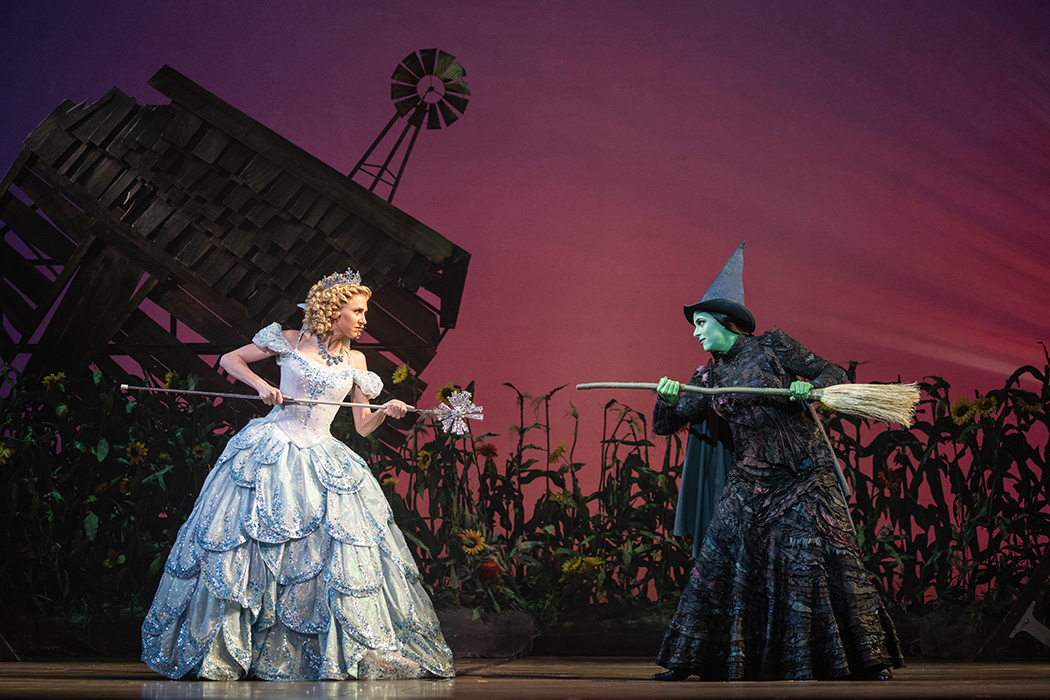“Defying Gravity” is quite a bit more than just the well-known song from the Stephen Schwartz musical Wicked. It accurately describes the phenomenon of that Broadway vehicle that is still stealing hearts and going strong after 20 years. In a genre that often sees a show’s gradual demise once the original stars have moved on, Wicked has enjoyed the opposite effect. Approaching 8000 performances in its continuing Broadway run that began in 2003, its national tours have also proved unbelievably popular. The incredibly impressive current one is playing to wildly enthusiastic full houses in a 16-show run in Knoxville’s Tennessee Theatre before moving on to eight more cities over the next eight months.
Just what are the reasons for this audience enthusiasm? Of course, there is the deliciously tuneful and addictive Stephen Schwartz score. Admittedly, though, the compelling intrigue here is Winnie Holzman’s book based on Gregory Maguire’s novel that is mostly prequel to the familiar tale of Dorothy (and her little dog, too) in the Land of Oz. It is that alternative perspective to storytelling featuring two strong female leading roles that has given the show solid legs with audiences.
That perspective begins with Elphaba (who will eventually become the Wicked Witch of the West), born with a puzzlingly “unexpected” green hue to the wife of the Governor of Munchkinland. She is shunned by her father who dotes on her younger sister, Nessarose, who is confined to a wheelchair.

Nessarose and Elphaba are sent to Shiz University, although Elphaba is ostensibly just along to assist her wheelchair-bound sister. At the school, Elphaba finds herself rooming with the perky, popular, and blond Glinda, the two having—apparently— absolutely nothing in common. Elphaba becomes friends with Dr. Dillamond, her history professor, who just happens to be a talking goat (and part of a significant sub-plot), while her inherent skills at sorcery attract the attention of Madame Morrible, Shiz’s headmistress. Opposites attract, it seems, and Glinda and Elphaba become friends despite competing for Fiyero, the show’s version of a Prince Charming. When Elphaba’s skills are recognized by the Wizard, the issue of the rights of animals become a cause, leading to the debate on the nature of wickedness. And, with timeliness, we have to confront the ideas of acceptance and empowerment, and the dangers of authoritarian corruption that are an ever-present danger.
The producers, keenly aware of past successes, have built on the fact of Kristin Chenoweth as Glinda and Idina Menzel as Elphaba in those original leading roles by subsequently casting replacements with singer/actresses that can bring their own big, distinctive voices and dramatic abilities without challenging the success of the original characterizations. In this production, Olivia Valli as Elphaba and Celia Hottenstein as Glinda have embraced the legacies of their characters with vocal and dramatic strength, but have also imbued those characters with fresh twists and shadings that are keenly contemporary.
Valli’s Elphaba is a warmly sympathetic character that oozes determination and even looks good in a pointy black hat. Her “I’m Not That Girl” is poignant in its expression of love and its reluctant acceptance that it can’t work out. And, as expected, her brilliant “Defying Gravity” was a stupendous Act I closer.
As Glinda, Hottenstein constructs a significant character arc taking a page from Legally Blonde’s Elle in which the sentiments of “Popular” eventually have to give way to the realities of life.

Although Wicked rides its broomstick on the strengths of the two leads, the secondary characters in this production are impressively strong. Boise Holmes was marvelous as Dr. Dillamond; Kathy Fitzgerald gave her Madame Morrible a truly wicked horribleness that was somehow deliciously likable. Fiyero was a charming Christian Thompson.
Ironically, the real villain here turns out to be the Wizard and his green elixir, given a satisfyingly rich, but dictatorial, turn by Timothy Shew. And kudos go to the ensemble that dances, flies, sings, and, in general, gives the crowd scenes their energy and excitement.
Although I suspect the set by the late Eugene Lee (and lighting by Stephen Posner) has received technological re-dos and updates over the years, its colorful premise of gears, wagons, and dragons works remarkably well as lavish in-your-face spectacle— one that seemed to shoe-horn quite snuggly onto the Tennessee Theatre stage. Oddly, the one technical downside here was a lack of clarity in voice reinforcement, leading one to unconsciously lean forward to grasp the dialogue and lyrics.
Wicked at the Tennessee Theatre runs through Sunday, January 21, with Saturday and Sunday matinees. Given the show’s popularity, I recommend checking out tickets sooner rather than later. Otherwise, you might end up green—with envy.






